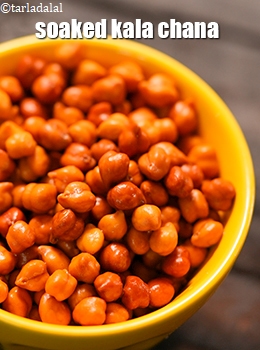• Kala chana is a form of conventional chickpeas. These lentils are very nutritious and used in curries and chaats.
• As black chickpeas retain their shape, these beans are a great addition to salads especially sprouted ones.
• They can be lightly sautéed and mixed with fresh diced onions, minced cilantro and lime juice to make a tasty side dish.
• Chickpeas can be cooked with or without salt, sautéed in garlic butter, or with mayonnaise and lightly cooked vegetables to make a delicious salad.
• It is a wonderful addition to Pani Puri.
• Kala chana can be used to make a great accompaniment for naan or roti, with or without other vegetables.
How to store kala chana, red chana, brown chickpeas
• Always store dry beans in a dry airtight container at room temperature, and not in the refrigerator.
• Once cooked, the beans can be kept in the refrigerator in a covered container for up to 5 days and in an airtight container in the freezer for up to six months.
• Beans are best used within one year, after which they may lose their moisture and take longer to soak and cook.
• Always rinse and sort beans before cooking as beans and lentils may sometimes be contaminated with very small stones.
Health benefits of kala chana, red chana, brown chickpeas
Kala chana is a healthy addition to your diet. Being
high in protein and
fiber,
Kala Chana a good option for those aspiring
weight loss. Like most pulses and legumes, kala chana also abounds in fiber, thus helping to keep you full for hours. When cooked with other healthy ingredients, kala chana is
suitable for heart disease as well.
Diabetics too enjoy them in restricted quantities. Brimming with calcium, they support bone health and being a good source of iron, they help build
red blood cells (RBC) and hemoglobin levels.
Boiled kala chana

First, wash and soak the kala chana overnight. Wash the soaked chana again in cold water till the water runs clear. Then, place the soaked kala chana in a large pot and cover completely with water. Add salt to taste, and cook covered. Remove from heat and drain it. It can also be cooked in a pressure cooker. The cooking time depends upon one's cooking method. Boiled kala chana can be enjoyed plain – hot or cold – or used in various dishes such as salads and subzis.
Soaked kala chana

Wash the kala chana thoroughly, place in a vessel full of water and allow it to soak. While it can be soaked overnight, generally 3-4 hours is enough to make them grow plump and ready for cooking. The cooked chana can be used in salads, recipes like chana masala or eaten as a chaat with onions and tomatoes, lime juice and masala powders.
Sprouted and boiled kala chana
.jpg)
Combine the sprouted kala chana, water and salt in a deep bowl, mix well and cook for 10 to 12 minutes or till they are cooked. Drain and use as required. Sprouted and boiled Kala Chana are used in curries, subzis, pulaos and snacks like Oats Chaat, Kala Chana Ambti etc.
Sprouted kala chana

Wash and soak kala chana (black chickpeas) in plenty of water, overnight. Next morning, place a cheese cloth on a strainer, and use this to strain away the water in the soaked chickpeas. Bring the edges of the cloth together and tie a knot. Hang the bundle in a windowsill. Allow to sprout. This usually takes a day or two. Once in a while, remove the bundle, sprinkle water and hang again or use a sprayer to keep the cloth moist. Check the sprout and remove it once it is optimally sprouted. If you let it sprout too long, the seed might turn bitter.
Remove the chickpeas once sprouted, and parboil in salted water until they are tender or steam-cook. Sprouted black chickpeas make a great snack and a good addition to curries, stews and kurmas. It is a tasty addition to Pani Puri too.